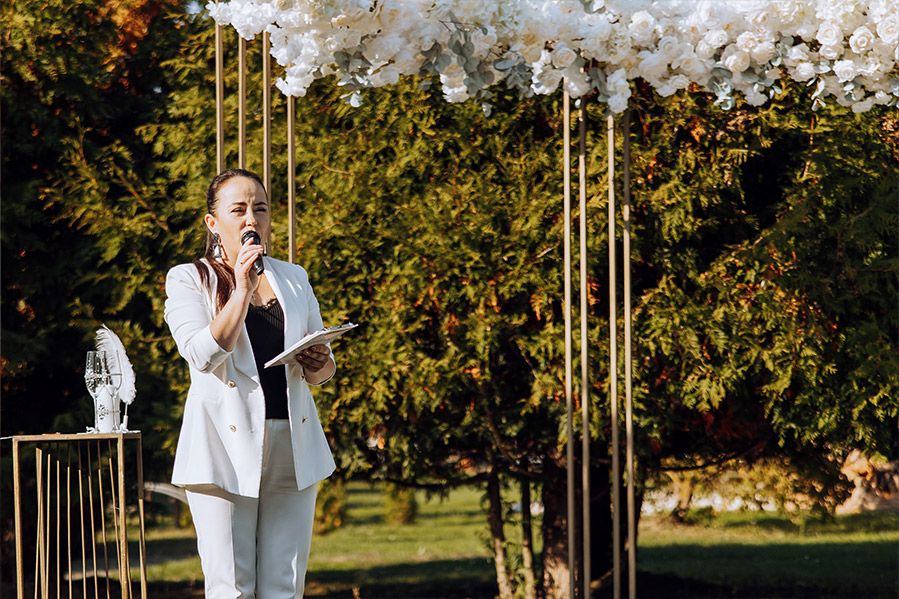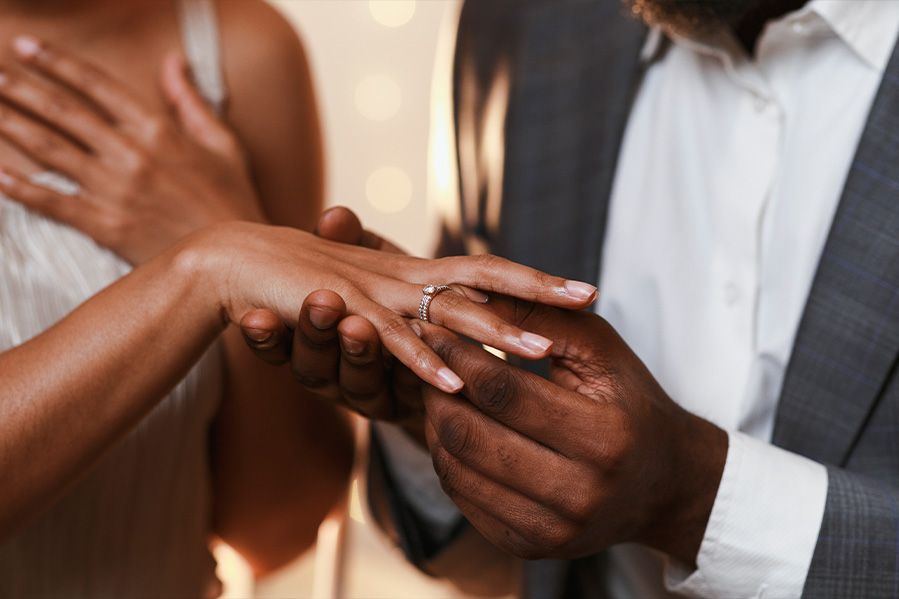
Weddings are significant life events, and the officiant plays a crucial role in making the day memorable for the couple and their guests. An officiant is the person who leads the wedding ceremony, guiding the couple through their vows and the legal aspects of marriage. The role of an officiant varies widely depending on the couple's preferences, the type of ceremony, and the legal requirements in the location where the wedding is taking place. This guide explores the responsibilities of a wedding officiant, the process of becoming one, the different types of ceremonies they may officiate, and tips for creating a meaningful and memorable ceremony.
The Role and Responsibilities of a Wedding Officiant
The wedding officiant is responsible for several key aspects of the wedding ceremony, ranging from the legal requirements to the emotional and spiritual elements of the event. The following are some of the main responsibilities of a wedding officiant:
Legal Authority: The officiant must be legally authorized to perform marriages in the jurisdiction where the wedding takes place. This typically involves being ordained through a recognized religious or non-religious organization. The officiant is responsible for ensuring that all legal requirements are met, including signing the marriage license and filing it with the appropriate government office.
Ceremony Planning: The officiant works closely with the couple to plan the ceremony. This includes discussing the structure of the ceremony, selecting readings, and helping the couple write their vows if needed. The officiant ensures that the ceremony reflects the couple's beliefs, values, and personalities.
Leading the Ceremony: On the wedding day, the officiant leads the ceremony, guiding the couple and the guests through each part of the event. This includes welcoming the guests, delivering a message or homily, leading the exchange of vows and rings, and pronouncing the couple as married.
Providing Support and Guidance: The officiant often provides emotional and spiritual support to the couple leading up to and during the wedding. This might involve pre-marital counseling or simply offering advice and reassurance as the couple navigates the wedding planning process.
Filing Legal Documents: After the ceremony, the officiant must ensure that the marriage license is properly signed by the couple and witnesses, and then filed with the appropriate government office. This step is crucial for the marriage to be legally recognized.
How to Become a Wedding Officiant
Becoming a wedding officiant can be a fulfilling way to participate in one of the most important moments in a couple's life. The process of becoming an officiant varies depending on whether you want to officiate one wedding for a friend or family member, or if you plan to officiate multiple weddings as part of your career or ministry.
Understand Legal Requirements: The first step in becoming a wedding officiant is understanding the legal requirements in the jurisdiction where you plan to officiate. In many places, officiants must be ordained or authorized by a religious or non-religious organization. The laws vary by country, state, and even county, so it's important to check with local authorities to ensure you meet all the necessary criteria.
Become Ordained: If you are not already ordained, you can become ordained through a recognized organization. Many people choose to be ordained online through organizations like the Universal Life Church. Online ordination is often a quick and easy process, but it's essential to ensure that the ordination will be recognized in the jurisdiction where the wedding will take place.
Learn About the Ceremony: If you are new to officiating weddings, take time to learn about the structure of a wedding ceremony, the traditions involved, and the various elements that can be included. Many organizations that offer ordination also provide resources and training for officiants, including sample ceremonies, legal guidelines, and tips for leading a successful wedding.
Build a Portfolio: If you plan to officiate weddings professionally, start building a portfolio of your work. This might include videos or testimonials from previous weddings, a list of the types of ceremonies you offer, and any additional services you provide, such as pre-marital counseling or custom ceremony scripting.
Connect with Couples: Whether you are officiating a wedding for a friend or working as a professional officiant, building strong relationships with the couples you work with is key. Meet with the couple to discuss their vision for the ceremony, learn about their relationship, and ensure that you understand their preferences and expectations.
Types of Wedding Ceremonies
Wedding officiants may lead a wide variety of ceremonies, ranging from traditional religious ceremonies to more contemporary or non-traditional events. Here are some of the common types of wedding ceremonies:
Religious Ceremonies: These ceremonies are typically conducted according to the customs and traditions of a particular religion. The officiant is usually a minister, priest, rabbi, or other religious leader who is authorized to conduct weddings within their faith community. Religious ceremonies often include specific prayers, readings from sacred texts, and rituals that are meaningful to the couple's faith.
Civil Ceremonies: Civil ceremonies are non-religious and are usually officiated by a judge or justice of the peace. These ceremonies are focused on the legal union of the couple and often have a straightforward structure, though they can be personalized with readings, vows, and other elements.
Non-Denominational Ceremonies: Non-denominational ceremonies are often led by officiants who are not affiliated with a specific religious denomination. These ceremonies may include spiritual or religious elements that are meaningful to the couple, but they are not bound by the traditions of any one faith. This type of ceremony is popular among couples who have different religious backgrounds or who prefer a more personalized approach to their wedding.
Interfaith Ceremonies: Interfaith ceremonies involve elements from two or more religious traditions. The officiant in these ceremonies must be knowledgeable about the practices and beliefs of the religions involved and be able to blend them in a way that is respectful and meaningful to the couple and their families.
Humanist Ceremonies: Humanist ceremonies are entirely non-religious and focus on the human experience, relationships, and love. Officiants for humanist weddings are often certified by humanist organizations and work with the couple to create a ceremony that reflects their values and beliefs.
Destination Weddings: Officiants may also lead destination weddings, which are held in locations other than the couple’s home area, such as a beach, mountain resort, or foreign country. Officiating a destination wedding may require additional preparation, including understanding local marriage laws and adapting the ceremony to fit the setting.
Creating a Meaningful Wedding Ceremony
The ceremony is the heart of the wedding day, and as the officiant, you have the unique opportunity to create a meaningful and memorable experience for the couple and their guests. Here are some tips for crafting a ceremony that resonates with everyone involved:
Personalize the Ceremony: Get to know the couple and incorporate elements that reflect their relationship, values, and personalities. This could include sharing their love story, using readings or music that are significant to them, or involving family and friends in the ceremony.
Write Custom Vows: Encourage the couple to write their own vows, or work with them to create vows that are meaningful and heartfelt. Custom vows add a personal touch to the ceremony and allow the couple to express their love and commitment in their own words.
Incorporate Rituals: Consider including rituals that have special significance to the couple. These might be traditional, such as lighting a unity candle or exchanging rings, or more unique, such as a sand ceremony, handfasting, or planting a tree together.
Practice the Ceremony: Rehearse the ceremony with the couple to ensure that everyone is comfortable with the flow of events. This can help alleviate any nervousness and ensure that the ceremony runs smoothly on the wedding day.
Engage the Guests: A great officiant makes the ceremony engaging for the guests as well as the couple. Speak clearly and warmly, and consider including elements that involve the guests, such as asking them to offer their support to the couple or inviting them to participate in a communal blessing.
Stay Calm and Focused: On the wedding day, your calm and focused demeanor will help set the tone for the entire event. Be prepared for any last-minute changes or unexpected situations, and handle them with grace and professionalism.
Deliver a Thoughtful Message: Whether it’s a homily, sermon, or personal reflection, the message you deliver during the ceremony should be thoughtful and relevant to the couple’s journey. Speak from the heart, and focus on the themes of love, commitment, and the significance of the marriage covenant.
The Legal Aspect of Officiating a Wedding
While the emotional and spiritual aspects of a wedding ceremony are essential, it’s also crucial to handle the legal aspects correctly. Here’s what you need to know about the legal responsibilities of a wedding officiant:
Marriage License: The couple must obtain a marriage license from the appropriate government office before the wedding. As the officiant, it’s your responsibility to ensure that the license is valid and that all the required information is accurately recorded.
Signing the License: After the ceremony, the marriage license must be signed by the couple, the officiant, and any required witnesses. Make sure that all signatures are in place and that the document is completed correctly.
Filing the License: The officiant is typically responsible for filing the marriage license with the county or municipal office where it was issued. This step is necessary for the marriage to be legally recognized, so it’s important to file the license promptly and correctly.
Understanding Local Laws: Marriage laws vary by location, so it’s essential to familiarize yourself with the specific requirements in the jurisdiction where the wedding will take place. This includes knowing who is authorized to officiate, what documents are needed, and any waiting periods or other legal considerations.
Officiating a wedding is both an honor and a responsibility. As a wedding officiant, you have the privilege of guiding a couple through one of the most significant moments in their lives. Whether you are officiating your first wedding or have been doing it for years, the key to a successful ceremony is preparation, personalization, and a deep understanding of the couple’s needs and wishes. By focusing on these elements, you can create a ceremony that is not only legally binding but also deeply meaningful and memorable for everyone involved.
Add Your Comment